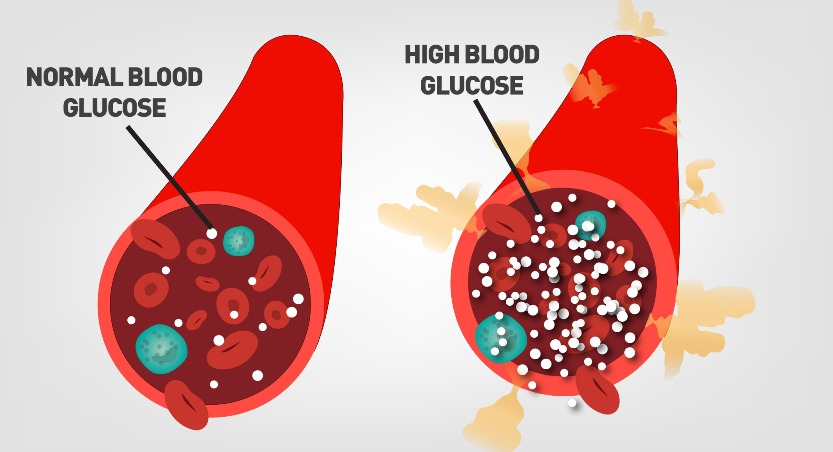Hyperglycemia: Hyperglycemia or high blood sugar is a condition in which an excessive quantity of glucose disseminates in the blood plasma. This is usually a blood sugar level greater than 11.1 mmol/l. Hyperglycemia doesn’t cause symptoms until glucose values are significantly raised, symptoms may not start to become remarkable until even higher values such as 15–20 mmol/l. However, some people who’ve had type 2 diabetes for a long time may not show any symptoms despite raised blood sugars.High blood glucose, or hyperglycemia, can cause major health complications in people with diabetes over time.

Hyperglycemia, according to World Health Organisation(WHO) as:
- Blood glucose levels greater than 11.0 mmol/L (200 mg/dl) 2 hours after meals
- Blood glucose levels greater than 7.0 mmol/L (126 mg/dl) when fasting
Causes of Hyperglycemia
A number of conditions or factors can contribute to hyperglycemia, including:
- Forget your insulin or oral glucose-lowering medicine
- Having an infection
- Experiencing high levels of stress
- Eating more carbohydrates
- Less physically active than usual
Hyperglycemia Symptoms
Early symptoms of hyperglycemia, or high blood glucose (sugar), may serve as a warning even before you test your glucose level. Typical symptoms may include:
- Excessive thirst
- Frequent urination
- Sugar in your urine
- Headache
- blurry vision
- Fatigue
- sores that won’t heal
- Headache
Later Symptoms
If hyperglycemia goes untreated, it can cause ketoacidosis. Signs and symptoms include-
- Nausea and vomiting
- Fruity-smelling breath
- Shortness of breath
- Weakness
- Dry mouth
- Confusion
- Abdominal pain
- Coma
Hyperglycemia Diagnosis
- Random blood glucose: Normal values are generally between 70 and 125 mg/dL.
- Fasting blood glucose: Normal fasting blood glucose levels are less than 100 mg/dL. Levels within 100 mg/dL up to 125 mg/dL suggest prediabetes, levels of 126 mg/dL or above are diagnostic of diabetes.
- Oral glucose tolerance test: This test is most commonly used to diagnose gestational diabetes.
- Glycohemoglobin A1c(HbA1C): Measurement of glucose that is bound to red blood cells and provides an indication of blood sugar levels over the past 2 to 3 months.
Treatment and Prevention of Hyperglycemia
An important part of controlling your diabetes is monitoring your blood glucose level regularly. Prevention of hyperglycemia for people with a diabetes is a concern of good self-monitoring and management of blood glucose levels, including adherence to insulin regimes if necessary.
A physician may need to evaluate the treatment plan for a diabetes patient who becomes hyperglycemic and practice one of the following actions-
- Raise the insulin dose
- Medication Adjustment
- Recommend more exercise
- Recommend dietary changes
- Recommend closer glucose monitoring
Hyperglycemia Complication
Short term Complication
Blood glucose levels rise dangerously high – this can lead to ketoacidosis and hyperosmolar hyperglycemic nonketotic syndrome.
Longer term Complication
Blood glucose levels stay high for extended periods of time – this can lead to the development of organ damage occurring which can lead to-
- Neuropathy
- Nephropathy
- Kidney Failure
- Diabetic Retinopathy
- Cardiovascular Disease
- Foot Problems(Diabetic Foot)
- Skin Problems(Bacterial and Fungal Infections)

